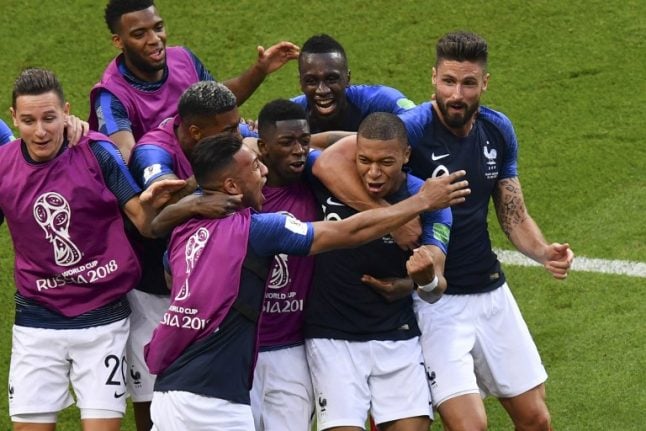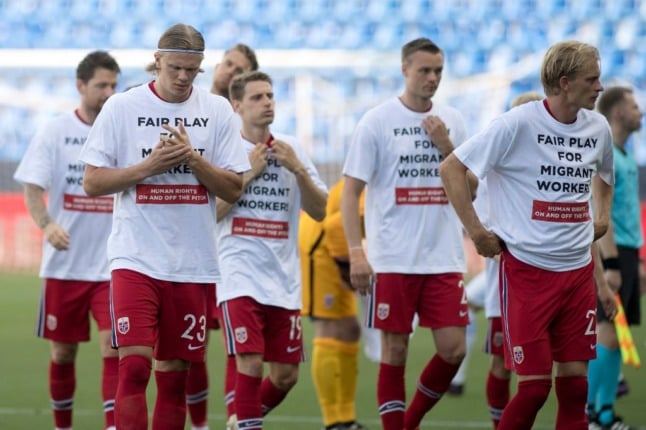WORLD CUP
France beat Messi’s Argentina 4-3 to reach World Cup quarter-finals
France beat Lionel Messi's Argentina 4-3 in a thrilling last 16 World Cup match on Saturday as teenager Kylian Mbappe scored two goals in a superb performance in Kazan.
Published: 30 June 2018 18:00 CEST

France's forward Kylian Mbappe (2R) celebrates with teammates after scoring his team's fourth goal against Argentina on Saturday. Photo: SAEED KHAN / AFP
The 1998 champions won 4-3 and looked a different side from the one that struggled to find their cutting edge in the group stage, pouring forward with pace and purpose to stretch the ageing Argentine defence in Kazan.
Antoine Griezmann gave France the lead from the penalty spot but the South Americans levelled after a sweet hit from Angel Di Maria and edged ahead shortly after half-time through Gabriel Mercado.
But defender Benjamin Pavard equalised with a thunderous strike to pull France level and once more change the complexion of the game. That set the scene for 19-year-old Mbappe, who netted two goals in four second-half minutes to become the first teenager to score at least twice in a World Cup match since Pele in 1958.
Sergio Aguero gave Argentina late hope but they ran out of time and head home after a rollercoaster ride in Russia that ultimately ends in bitter disappointment for the two-times former champions.
Man-of-the-match Mbappe brushed off the Pele comparisons.
“I'm very happy and it's flattering to be the second teenager (to score twice in the knock-out rounds) after Pele but let's put things in context: Pele is in another category, but it's good to be among these people,” he said.
Coach Deschamps salutes 'great' performance
Coach Didier Deschamps said France had responded to their critics with a “great” performance. France struggled to convince during the group stage of the tournament in Russia and Deschamps said he was happy they had finally lived up to expectations.
“We had to respond (to the critics) and we responded well,” he said. “Criticism is always there. But there is truth on the pitch and (the response) came through a strong and quality performance which we delivered tonight. We made Argentina suffer.”
“It was a great fixture and a great match,” he told TF1. “There were mistakes, obviously. We started badly at 2-1 down but we knew what we needed to do. We could have kept things a bit simpler near the end of the game, though.
“There was a lot of emotion. I am happy for the players who went out to get this qualification for the quarter-finals. As I told them before the game, we have been preparing for months, for weeks to play matches like that.”
Ragged Argentina
Beaten finalists four years ago, Argentina only reached the last 16 by the skin of their teeth after a shambolic group phase and despite a brave effort against France, their ageing squad and lack of balance ultimately caught up with them.
Messi, at the age of 31, may have played his last World Cup game in a career curiously unfulfilled at international level despite his astonishing achievements with Barcelona and his multiple individual awards.
France will play either Uruguay or Portugal in the last eight. Portugal's Cristiano Ronaldo — with his eternal rival Messi now out of the way — will be looking to further burnish his reputation against Uruguay in Sochi.
Url copied to clipboard!


 Please whitelist us to continue reading.
Please whitelist us to continue reading.